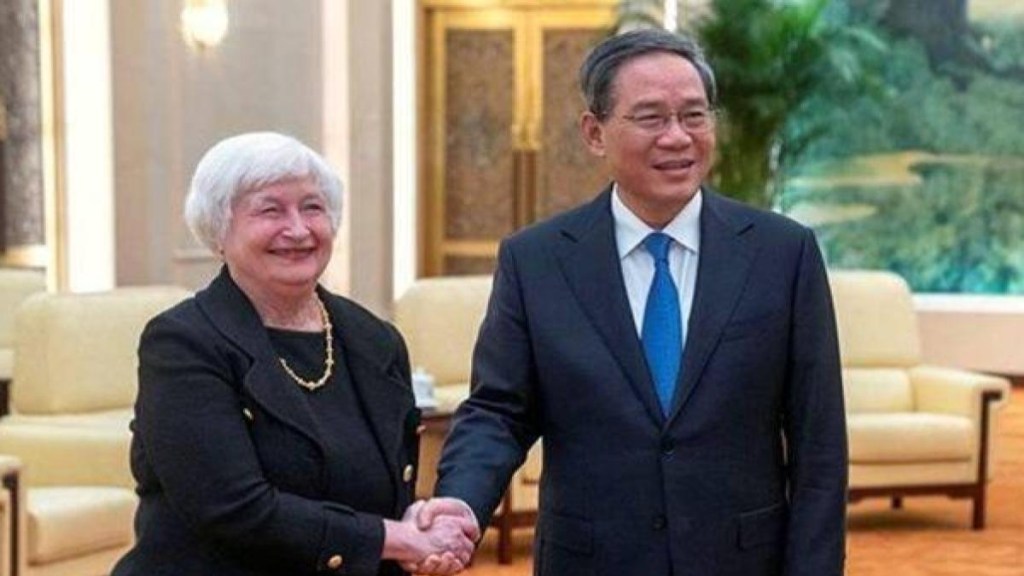Treasury Secretary Janet Yellen concluded her significant visit to China with a positive yet pragmatic tone, highlighting her concerns about “unfair” economic practices while emphasising the need for cooperation. Yellen held a press conference after her four-day mission to Beijing, which aimed to revive engagement between the world’s two largest economies. Recent years have witnessed increased tensions between Washington and Beijing, encompassing issues such as Taiwan and technology access.
During her time in China, Yellen engaged in 10 hours of direct and substantive talks, fostering a closer relationship between the United States and China. She dedicated half of her time to discussions with her counterpart, Vice Premier He Lifeng, marking the first extensive exchange between the two policy chiefs since China’s new economic team assumed office. Yellen also had a shorter meeting with Premier Li Qiang, which allowed for a broader discussion on the US-China relationship.
Chinese economic policies
Yellen faced a delicate task in Beijing. She aimed to raise concerns about Chinese economic policies while advocating for greater cooperation, particularly in addressing global challenges such as climate change and debt distress in less affluent nations. This visit served as a major test for the policy Yellen outlined in April, which aims to safeguard US national security without hindering China’s economic progress. During her trip, she addressed contentious issues including China’s “non-market” practices and the increasing use of coercive actions against American companies. Yellen also cautioned Chinese firms against providing support to Russia’s war in Ukraine.
Despite these points of contention, Yellen’s overall message in China emphasised that the two countries are not engaged in a “winner-take-all” competition and should manage their rivalry through fair rules. She stated, “President Biden and I do not see the relationship between the US and China through the frame of great power conflict. We believe that the world is big enough for both of our countries to thrive.”
Yellen’s visit to China aligns with President Joe Biden’s administration’s broader efforts to repair relations with America’s main geopolitical rival while conveying clear messages about US policy. She is the second member of Biden’s cabinet to visit China in three weeks, following Secretary of State Antony Blinken’s trip in June. US Climate Envoy John Kerry is also expected to visit later this month for discussions on global warming.
According to Treasury officials, Yellen’s primary objective in Beijing was to establish communication channels with China’s new economic team. She reiterated this goal to Vice Premier He, stating, “Where we have concerns about specific economic practices, we should and will communicate them directly.” Vice Premier He agreed to strengthen communication and cooperation on global challenges, but also expressed concern about US sanctions and other restrictive measures against China. He cautioned against generalising national security, stating that it hampers economic exchanges.
Serious concerns
Yellen’s trip began on Friday with key members of the old guard of China’s economic policy during her trip, including Liu He — a fluent English-speaking veteran of the international stage who had studied at Harvard University and with whom Yellen had established a rapport.
She also met Friday with Pan Gongsheng, who is expected to take over as governor of the People’s Bank of China. Yellen on Saturday sat down with Chinese climate experts, a team of female economists and US businesses operating in the country.
The Treasury chief reiterated concerns about “punitive actions” China had taken against American firms in recent months. The Chinese government in May banned US chipmaker Micron Technology Inc.’s products from some of its critical sectors, and raided the offices of US consultancy Bain & Company and New York-based due diligence firm Mintz Group earlier this year.
Days before her arrival, China announced restrictions on exporting two metals that are crucial to key technology industries.
That was the latest escalation in a trade war that ramped up last year with US export controls on semiconductors and chip making equipment. Those tensions could escalate as Biden’s team prepares an executive order curbing US outbound investment in China
While Yellen said the US would continue to take “targeted actions” to protect our national security, she said such steps would not be used to “gain economic advantage.”
(With inputs from Bloomberg)
